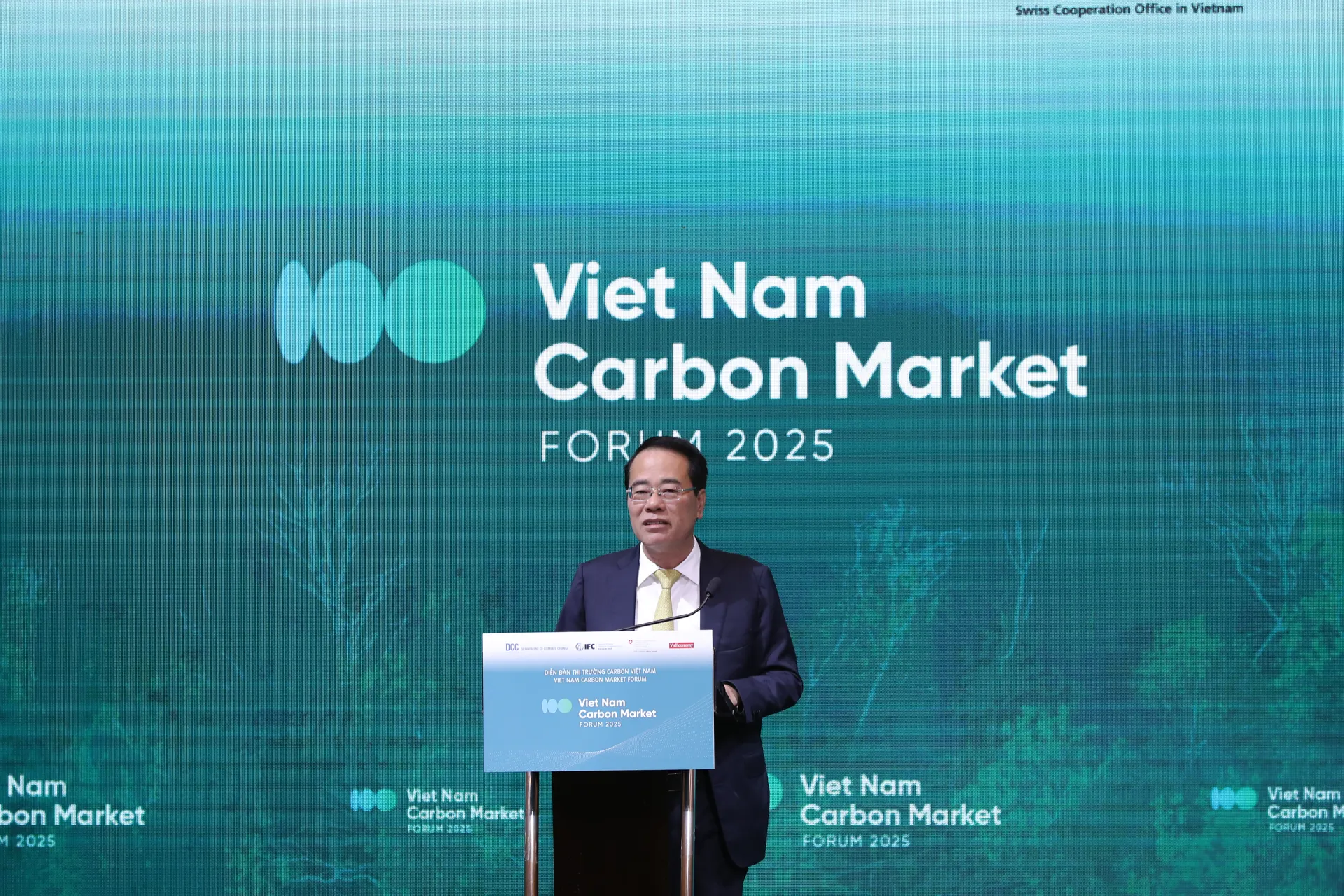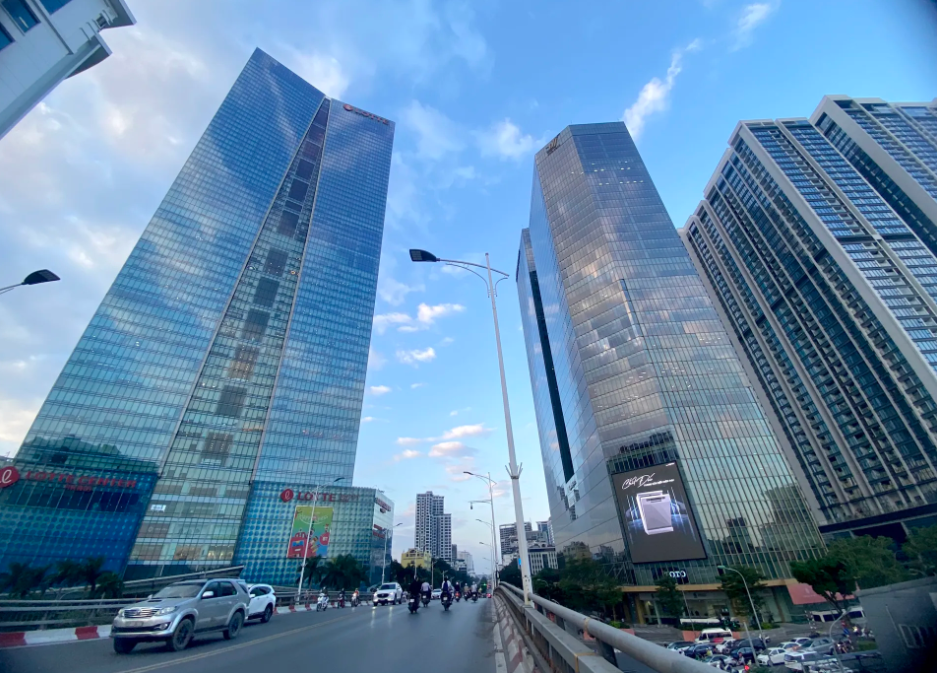Carbon market to accelerate Vietnam's path to a net-zero economy
Vietnam's long-term goal is connecting its carbon market to regional and global markets, including the EU, China, and South Korea.
Vietnam's carbon market is among factors help drive the country towards a zero carbon future. Director of the Department of Climate Change under the Ministry of Agriculture and Environment (MAE) talked to The Hanoi Times about the market prospects.

Director of the Department of Climate Change Tang The Cuong at a recent event on Vietnam's carbon market. Photo: Ngoc Mai/The Hanoi Times
Vietnam has taken important steps to establish a carbon market. What can we expect about the legal and institutional foundations in 2025?
Vietnam's carbon market journey was formally set in motion by the Law on Environmental Protection 2020, specifically Article 139, which laid the legal foundation for the organization and development of the market. Building on this, the government issued Decree No. 06/2022, which defined the structure, implementation roadmap, and responsibilities of relevant ministries.
Several ministries are involved, including the Ministry of Agriculture and Environment, the Ministry of Finance, the Ministry of Industry and Trade, and the Ministry of Construction, each of which plays a critical role in shaping and operationalizing the system.
A key milestone was the prime minister's Decision No. 232 issued on January 24, 2025, which approved the National Carbon Market Development Plan. This plan addresses both the regulatory and technical dimensions of market design and serves as the central strategic document to guide implementation.
Currently, the Ministry of Finance has submitted a draft decree on the operation of Vietnam's domestic carbon trading platform, which is expected to be enacted by mid-year. This forthcoming regulation will provide detailed rules for the trading of emission allowances and carbon credits, the latter being certificates that represent one ton of CO₂ (or equivalent) reduced or removed from the atmosphere.
We expect pilot operations of the national carbon exchange to begin in 2025 and run through 2028. This phase will serve as a learning period, allowing us to fine-tune the legal and technical aspects before the market transitions to full compliance-based operations by 2030.
Once operational, the carbon market will be a key policy tool to incentivize companies to adopt greener practices, boost competitiveness, and help meet our net-zero commitment by 2050.
How will Vietnam’s carbon market align with international frameworks, and what mechanisms are being designed for cross-border crediting?
Vietnam is closely calibrating its carbon market to international climate commitments, particularly under Article 6 of the Paris Agreement, which governs the transfer of emission reductions across borders. This means that any transferred carbon credits must be reflected in our national inventory and deducted from our Nationally Determined Contribution (NDC), while being added to the buyer country's tally. This ensures environmental integrity and avoids double counting.
To facilitate this, we are developing a second regulation under Article 139 to provide the legal basis for international emissions trading. This regulation will detail how domestic emission reductions and credits can be used in bilateral or multilateral agreements.
A national registry system is also under development. This system will record the full lifecycle of emission allowances and carbon credits, from issuance and transaction to retirement, and will be integrated with global standards, such as Verra and Gold Standard. When a Vietnamese enterprise registers a project under an international standard, the activity will be reflected in our registry, ensuring transparency and global recognition.
Vietnam’s long-term ambition is to connect our carbon exchange with regional and global markets, including the EU, China, and South Korea. Following the pilot phase, we will conduct a comprehensive review to develop the platform into a robust, internationally compliant carbon market.

Hanoi is among Vietnam's top cities with the largest carbon footprint. Photo: Thanh Hai/The Hanoi Times
What role does the private sector play in this transition, and how is the government enabling enterprise participation?
Private sector engagement is critical to the success of the carbon market. Together with the World Bank and the International Finance Corporation (IFC), we've conducted extensive research that shows a strong interest among Vietnamese businesses in generating and trading carbon credits. Many are already involved in reforestation, energy efficiency, or renewable energy projects, but they need a clear regulatory framework to scale up their efforts.
An important development is the proposed revision of Decree No. 06, which introduces a more flexible offsetting mechanism. In the initial phase, we plan to allow businesses to offset up to 30% of their emissions with carbon credits from the current 10%. This will ease compliance pressures while firms transition to cleaner technologies.
Our vision is to create a dynamic carbon market ecosystem. For instance, a forestry enterprise that generates removal credits could sell them to industrial emitters such as steel or cement producers, creating a balanced and efficient trading environment.
To help companies navigate this system, we are preparing a comprehensive Carbon Market Handbook to guide them through voluntary market participation, credit certification, and compliance procedures, essentially providing a roadmap for engagement.
One challenge, however, is the limited number of accredited verification entities in Vietnam. While Decree No. 06 requires robust monitoring, reporting, and verification (MRV) in line with international best practices, only a few domestic organizations are currently equipped to play this role. We're actively working to accredit more verifiers to strengthen domestic capacity and ensure alignment with Intergovernmental Panel on Climate Change (IPCC) guidelines and global standards.
With the carbon exchange expected to launch its pilot phase this year and a full regulatory framework in place by 2025, Vietnam is on a promising path. Not only are we creating a vital tool for climate action, but we are also laying the foundation for a sustainable, low-carbon economy that will attract international investment and foster green innovation.
Thank you for your time!








